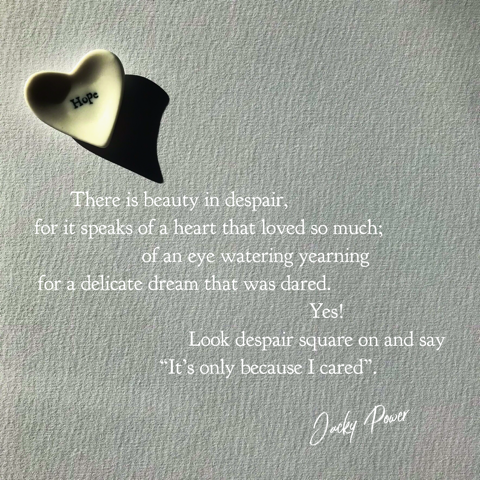Uncertainty can often ride shotgun with fear.
And when that’s ongoing, it can rapidly inflate into despair.
It’s excruciating to live with the not knowing, the not curing, the not healing. It’s difficult when we are thrown into change that we did not choose. It’s bewildering, shifting, like the world did a 180 flip with no warning.
Despair is lonesome. We don’t want to reach out for fear of people not getting it, or trying to fix it, or putting a time limit on our grief, encouraging us to “get over it” or “stay positive.”
Settling into the chaos of despair is how we can actually move on. When we feel despair, everything can feel just too much and we can tell ourselves:
“I’m not (fill in missing blank) enough.”
“I will never (fill in missing blank).”
“The world is sooooo (ditto).”
There is a globalisation of the negative and a minimisation of the positive.
My advice to you: write a letter from your despair.*
Take a piece of paper and start with, “Dear X, I am your despair and this is what I need to tell you.”
Let it all out, including all of the exhaustion and frustration—leave everything on the page. Rather than adding to despair by chastising ourselves for “not being able to get out of it,” we can get curious.
Then write a letter from your resilience, answering the letter to your despair: “Dear despair, I am your resilience and this is what I need you to know.”
Let your despair know: right now in this moment, what you have enough of (food/clothing/love) for today. There have been times that you have felt overwhelmed in the past. Tell your despair how you managed to handle it. Remind it of the things that help, the things that bring you some peace.
The irony is that, by allowing the despair to really “be,” it starts to change. Seeing it for what it is helps us to surrender to the reality of the situation, to give up our willfulness for things to be different—which is really at the root of the despair.
Surrendering is easier said than done. We may need to act “as if” we have done so for a while.
At the beginning of the outbreak, my youngest cried to me that he was really worried that I was going to get Coronavirus and die. You gotta love the subtlety of a seven-year-old! He told me that he wasn’t ready to be without a mum because he was only seven and was not prepared.
I could relate.
We, as a world, were not ready, not prepared.
What did I say back to him?
I agreed that I don’t know what will happen, but what I do know is that if I end up on a bed fighting for my life (gotta love the subtlety of a seven-year-old’s mum!) I want to be able to think back over the last days as really living life to the fullest I possibly can; of loving with all my might and feeling with all my senses to make the most of this one shot at a human life.
It’s an opportunity to remember what is most important: love, compassion, and this very moment now, because that is all that any of us truly have.
If I can just act “as if’” I’m accepting of what is going on right now, then maybe there will be little glimmers of light along the way…
>> Like the 40th birthday I did on Zoom singing along to “Bohemian Rhapsody” dressed up as a rabbit.
>> Like the one lettuce seedling my youngest son and I managed to grow from seed this week.
>> Like painting my teenager’s bedroom with him over the Easter holidays and watching him make his own interior decor decisions (gulp!).
So allow yourself your despair. Write your letters. Be unafraid to look it square on. By doing so, you may see that not all of your life is a cause for despair.
Then, hope has a chance of sneaking up. Not hope that things will be different, but hope that there can be beauty in the despair.
~
*Author’s note: This letter writing is an adaptation from Elizabeth Gilbert’s Big Magic Workshop where she invited participants to write letters to and from different “parts” of oneself.






Read 0 comments and reply